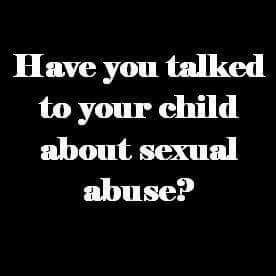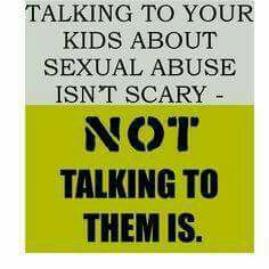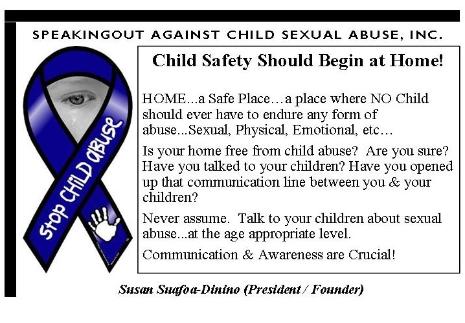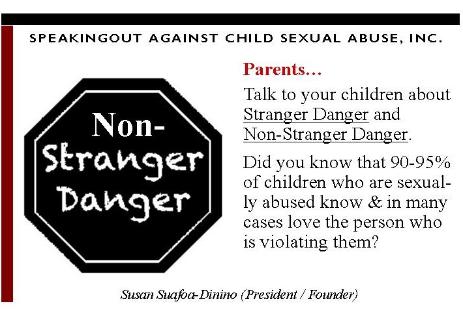
SpeakingOut against Child Sexual Abuse, Inc. Message to Parents |
Parents, about Child Sexual Abuse...
Never assume that just because you know where your child is & who they are with, that this could not happen to them.
The Sexual Abuse of Children can & does happen every single day in America & around the World…to countless numbers of children. It is
important to understand that 90 – 95% of children who are molested, raped and/or exploited know the person abusing them & in many
cases, the child loves & trusts that person.
The first step in prevention is understanding that there is an enemy out there…and there are many enemies out there who are harming
children of all ages.
Never assume that if your child is or has been sexually violated that they will tell you.
Sexual Predators know how to silence children. And as a Parent, your understanding of this horrific crime is imperative for your child’s
safety.
Never assume that just because you know where your child is & who they are with, that this could not happen to them.
The Sexual Abuse of Children can & does happen every single day in America & around the World…to countless numbers of children. It is
important to understand that 90 – 95% of children who are molested, raped and/or exploited know the person abusing them & in many
cases, the child loves & trusts that person.
The first step in prevention is understanding that there is an enemy out there…and there are many enemies out there who are harming
children of all ages.
Never assume that if your child is or has been sexually violated that they will tell you.
Sexual Predators know how to silence children. And as a Parent, your understanding of this horrific crime is imperative for your child’s
safety.
| WHAT CAN YOU, AS A PARENT, DO? Learn All that You Can Talk to Your Child Minimize the Risk Look for Warning Signs Know Your Child’s Surroundings Inquire about Safety Precautions Taken by Others Familiarity With The Statistics Tell Others Break the Cycle in Your Family |
Learn all that You Can…
Get educated on the crime of child sexual abuse.
Get educated on sexual predators of children.
Continue Education / Keep Up-To-Date
Get educated on the crime of child sexual abuse.
- Hard topic, but critical to understand.
- Know the enemy. It's much easier to fight the enemy if we know who and what they are. And make no mistake...anyone who
wants to sexually violate a child is an enemy. - Utilize any/all available resources to learn all that you can.
Get educated on sexual predators of children.
- How they do what they do.
- How they groom children and their families.
- How they silence children.
- What they count on from each and every one of us, including the systems in place that are supposed to protect children.
Continue Education / Keep Up-To-Date
- Sexual Predators are constantly looking for and finding new ways to get to children. Know them.
- Understand how sexual predators use the internet, cell phones, etc... to get to children.


| This Page is Still Under Construction. Thank you for your patience while we revamp & update our website. Please continue to check back. |
| Talk to Your Child... We talk to our children about many things...the importance of education, the dangers of drugs and alcohol, etc... We may even mention to our little ones that no one should ever touch their private parts and we assume that if anyone ever did, that our child would tell us. In addition, we teach our children to never talk to strangers. The problem with stopping there is that 90 - 95% of children who are sexually abused know the abuser. These sexual predators are not strangers in most cases. The fear is that by not talking to children about sexual abuse, parents my be unknowingly and unintentionally enabling their child to be "easy prey" for the many sexual predators out there. You cannot equip or protect your child from sexual abuse without becoming educated on this crime and then talking to your child...specifically about rape, incest, molestation and sexual exploitation; at the age-appropriate level. There is still no guarantee of prevention. However, the likelihood of prevention is so much greater when both you and your child are educated on this crime. Children need to know the dangers out there. They need to know that if this happens or is happening to them, that they can come to you. They need to know that no matter who may be doing this to them, that you will believe them. They need to feel safe to tell on the abuser no matter who the perpetrator is. Most children are sexually abused and silenced by someone they know and in far too many cases, by someone they love and trust. Explain to your child that although they are generally expected to respect adults and authority, that there are exceptions to that rule. Teach them it is okay to say "NO" and that it is important that they tell. |


| Be Sure to Check Out the "Resources" Tab in this Website |